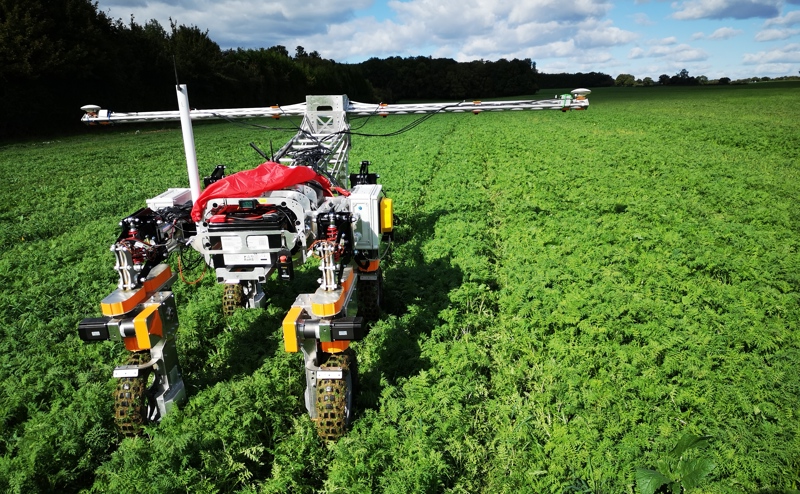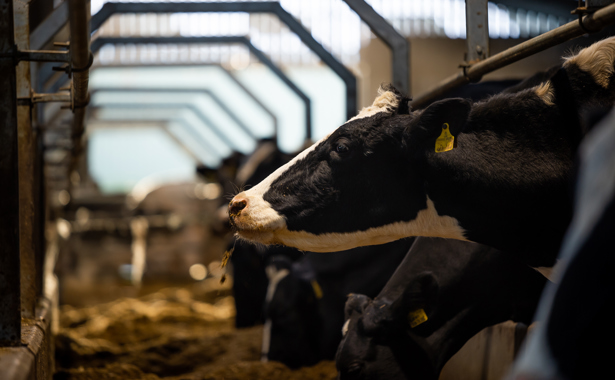
Dorset to get world's first 5G-ready agri-robot
by Wessex Internet Team
Wessex Internet has today announced its partnership with Small Robot Company (SRC), a British agritech start-up for sustainable farming, together with the 5G RuralDorset project Telint and Dorset Council, to develop a blueprint for rural-optimised 5G connectivity, with the world’s first 5G-ready agri-robot for arable farms.
The resulting 5G blueprint will enable rapid deployment of 5G to rural areas. This has the potential to dramatically close the Rural/Urban digital divide for farming and rural communities. This could be game-changing, boosting rural investment, creating skilled jobs and improving prosperity.
The project will develop an affordable, reliable and interoperable 5G network that is custom-designed for farmers and the particular challenges of rural connectivity. It will look to explore how 5G and its roll out might be able to provide a step-change in the industry. The £7 million project is being part-funded (£4.5m) by the Department for Digital, Media, Culture and Sport as part of its 5G Testbeds and Trials Programme.
The 5G robotics trial aims to demonstrate a revolution in farming, increasing productivity, yields and biodiversity while simultaneously reducing environmental impact. Importantly, it also looks to improve soil health and reduce emissions, helping farmers meet the UK agriculture target of Net Zero by 2040.
Alongside the work with SRC, Wessex Internet is working with other future industry players to trial uses of 5G connectivity in agriculture. The aim is to deliver novel high/mid bandwidth 5G solutions and breakthrough innovation within agriculture. Anticipated benefits include empowering farmers with cost-effective, interoperable agritech; and more localised and efficient supply chains, linking local needs with local produce to improve food security, reduce waste and provide higher-value local produce.
“This 5G blueprint could be a catalyst for rural economies – with our robots demonstrating the potential for 5G to transform agricultural productivity. Connectivity is not a luxury. It’s a utility. And vital to economic performance,” commented Ben Scott-Robinson, CEO and co-founder, Small Robot Company. “5G technological development within agriculture is vital post-Brexit. One of the biggest obstacles facing UK farmers in adopting new technologies is poor connectivity around the farm. This 5G blueprint will pave the way for growth in the rural economy – and alongside it greatly-improved quality of life.”
Hector Gibson Fleming, Managing Director of Wessex Internet explained: “Our work taking full-fibre broadband to farms, homes and businesses in rural communities has shown us how great connectivity can transform countryside communities. But connectivity across farms remains a massive issue. Exciting technological developments in agriculture have the potential to transform farming, but are held back by poor connectivity and mobile coverage. We hope the 5G networks we’re building across a number of Dorset farms, and the exciting 5G applications we’re trialling, such as Small Robot Company’s agri-robots, will be a shining example of what the future can look like.”
Telint Ltd’s MD Dave Happy noted: “Today people typically only think of using low frequency spectrum for all rural uses. With this work we are turning that conventional wisdom on its head because the high-speed radio connectivity required here demands the use of shorter range higher frequencies. We are delighted to be assisting on the spectrum aspects of this exciting work.”
Agricultural Productivity
The project will build a 5G ecosystem within the agriculture/aquaculture industry. Wessex Internet will trial uses of 5G connectivity in agriculture, looking to establish sustainable business models that can be rapidly commercialised. 5G robotics could completely revolutionise the way we farm and bring enormous benefits to the environment. Rural-optimised 5G connectivity also allows for the potential to reduce the cost of operating robots – which is already significantly less than conventional farm machinery.
It is anticipated that 5G robotics will enable real time capabilities such as the ability to quickly identify pests like slugs and immediately take action; and enabling farmers to act faster to exploit the UK’s dry weather windows. Reducing the use of pesticides by improved precision mapping and weeding without the use of herbicides can improve biodiversity and soil health. It will also provide farmers with live operational information such as soil moisture and crop emergence. Seamless and real-time data and systems integration will also break down vertical silos, eliminating manual data transfer, reducing costs and greatly improving decision making.
The trials will be the first to demonstrate wide-scale autonomy of robotic farming operation, including the development of the UK’s first ‘5G-ready’ agri-robot; development of the first scalable, costed, ‘as a service’ agri-robot product; development of SRC’s first ‘ready-for-market’, ‘fit-for-purpose’ agri-robot; and development of SRC’s on-farm 5G-enabled robot ‘kennel’. The 5G-connected Robot Handler App also brings the potential of a remote operator seeing live data or taking live control of the robot.
The within-farm robot-to-kennel communications is fundamental to the real-time capabilities, as well as the farm itself being better connected. The on-farm 5G-enabled robot ‘kennels’ will aim to process huge volumes of data from robots “on the fly,” exploiting the benefits of using higher frequency 5G spectrum and infrastructure so farmers can take more timely corrective action to maximise yields and minimise pesticide use – vital given the British weather!
Mike Donnachie, Farm Manager at Ranston Farms noted: “Having precise and accurate data to hand so I can make instant decisions will bring great benefit into the future.”
Dorset Council Deputy Leader Peter Wharf remarked: “Farming in rural areas such as Dorset is a way of life for communities. It is our hope that in making farming operations more sustainable through partnership with the Small Robot Company we can revolutionise not only the productivity of agricultural operations but also reduce its impact on the environment through novel uses of monitoring and weed control. In doing so we will make agriculture part of Dorset for generations to come.”
Digital Infrastructure Minister Matt Warman said: “As we level up rural communities, we’re proud to be backing 5G RuralDorset and the many innovative projects it’s involved with – from intelligent buoys to 5G seaweed farms. This has huge potential to close the divide between rural and urban areas and transform agriculture as we build back better and greener for a more prosperous future.”
Project details
Wessex Internet will be delivering three farm 5G networks on the back of its existing 2,100km full-fibre network as part of the 5G RuralDorset trials. As a company with a farming background, the rural connectivity provider will be aiming to experiment with a 5G network which is fit for the industry – testing the technical and commercial viability of 5G deployment models in rural areas. The trials with the Small Robot Company robots will be taking place at the Ranston Farm 5G trial site.
SRC is building a 5G-enabled Tom monitoring robot, Kennel and Robot Handler App. In addition, the project scope includes a 5G-enabled Dick non-chemical weeding robot. SRC will test this capability in Dorset from October 2021 to March 2022, writing a report on the resulting outcomes and benefits for its Farming-as-a-Service robotics model.
Sam Watson Jones, President and co-founder, Small Robot Company, concludes: “The opportunity is immense. Our technology is closely aligned with the new Agricultural Bill, at the heart of these systemic changes in farming. The 5G RuralDorset Project is an opportunity for us to work with farmers to create a more sustainable and productive farming model. The recent huge advances in agtech finally make this possible: and farmers are integral to the environmental solution”
